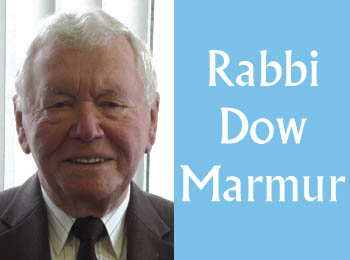In a lecture in Jerusalem some four years ago, Rabbi David Hartman, who died last month, sounded uncharacteristically despondent. I decided not to argue with him in public, but wrote him a letter. Part of its concluding paragraph reads: “Though the Hartman line hasn’t conquered the world, or even Israel, its influence has been enormous. You have helped your generation of rabbis and the next to think outside the denominational box. I am always happy to describe you as the father of contemporary post-denominational Judaism.”
At that time, one of his disciples had become the president of the (Reform) Central Conference of American Rabbis. Another, who spoke at the funeral that was attended by hundreds of people – from black hats to bare heads – is Rabbi Rick Jacobs, the president of the Union for Reform Judaism. He said that he would have never become who he is today without the inspiration and mentoring he had received from Rabbi Hartman.
Though not a Reform Jew by any stretch of the imagination, Rabbi Hartman was a proud recipient of an honorary doctorate from Hebrew Union College, where most Reform rabbis in the world are trained. Many of its graduates have been touched by his teachings.
Rabbi David Hartman was also Prof. David Hartman, one of the most significant thinkers in contemporary Judaism. His innovative writings that sought to reflect the new reality of Jewish sovereignty in Israel will influence generations to come. The institute he created and named after his late father, Shalom, now in the capable hands of his son Rabbi Donniel Hartman, has become a centre for new and creative thinking in contemporary Judaism.
In his eulogy, Prof. Israel Knohl, distinguished Bible scholar and one of the senior fellows of the institute, illustrated Rabbi David Hartman’s greatness by showing how he constantly modified his thinking in the light of new realities, insights and experiences. As an example, he reported that only recently, Rabbi Hartman declared that he had erred in understating the true significance and impact of the Holocaust for contemporary Jewish life and thought.
The two most distinguished Jewish philosophers to make aliyah from Canada were Rabbi Hartman, who left his thriving congregation in Montreal in the 1970s, and the late Prof. Emil Fackenheim, the world-famous thinker, who came a decade later when he retired from the University of Toronto. They were neighbours in Jerusalem, yet could have inhabited different planets. What divided them was their understanding of the Holocaust. Should they now meet in the next world, they’ll at last be at one.
The many moving words spoken at the funeral by his children and colleagues praised Rabbi Hartman not only as teacher and philosopher, but also as a warm and complex human being. Knohl used three Hebrew words to describe him, each beginning with the letter aleph, albeit vocalized differently: emet (truth), ometz (strength) and ahavah (love).
Rabbi David Hartman was the quintessential seeker of truth, always eager to learn from everybody, yet arguing with all, including the teachers he admired and who had inspired him, notably Rabbi Joseph Soloveitchik.
Rabbi Hartman possessed great strength and determination, reflected in the magnificent institution he built and the impact it continues to have on countless women and men across the entire spectrum of Jewish life, both in Israel and, particularly, abroad. He was a courageous man whose commitment to truth made all whose lives he touched to admire and respect him.
But above all, Rabbi David Hartman was a man who loved not only his family, as nobly expressed by three of his five children who spoke at the funeral, but also Torah in all its manifestations and the Jewish People in all its diversity. That was the secret of his charisma. He attracted disciples by the strength of his personality no less than through the power of his writings.
Rabbi Hartman never ceased to struggle with God and tradition: his latest book is called, The God Who Hates Lies. But he never abandoned either. He remained a passionately faithful and consistently observant Jew to his last day. He taught his students and his readers how never to compromise with the quest for truth and, at the same time, never to give up on the strength that Judaism bestows on those who practise it.
